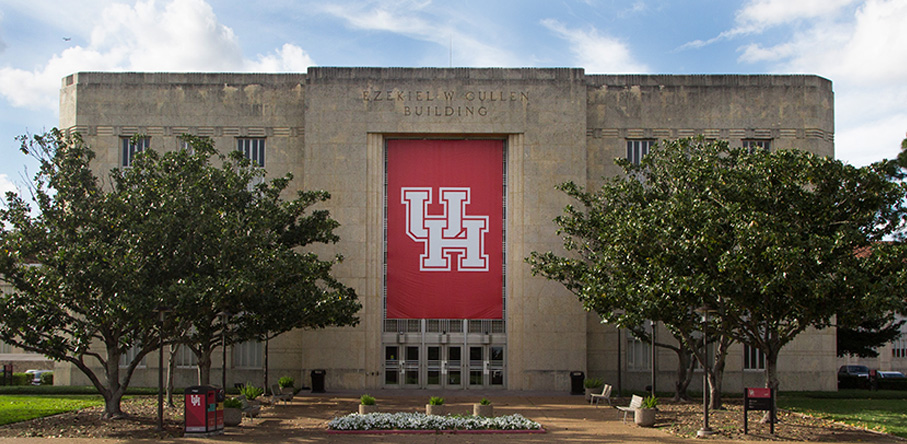University of Houston

Founded in 1927 and led by President Renu Khator, the University of Houston is the city’s leading public research university and the third-largest university in Texas. Nationally, UH is competitively ranked. The University also serves students at UH instructional sites in Sugar Land and Katy, and at the UH Technology Bridge. The nearly 895-acre campus, located in a sprawling metropolis, features walkable green spaces, world-renowned public art and iconic fountains.
Situated in the fourth largest city in the U.S., students have unprecedented access to internships and research opportunities with global industry leaders and premier health care centers. The effect of the University on the Houston community is profound. UH has more than 600 partnerships with community organizations, and students contribute almost 1 million hours of internship service and volunteer hours each year.
UH draws strength from its cultural richness and transforms lives and communities through education, research, service and innovation in a real-world setting. In fall 2023, UH enrolled more than 46,600 students in more than 280 undergraduate and graduate programs. UH houses approximately 8,400 students within nine on-campus residential communities. UH awards more than 11,000 degrees annually and has more than 332,900 alumni. Tuition and fees for in-state undergraduate students is considered affordable. UH ranks No. 31 nationwide for social mobility according to the 2024 U.S. News & World.
The University is accredited by the Southern Association of Colleges and Schools Commission on Colleges. Emblematic of its commitment to fostering a university environment dedicated to the success of culturally rich students, UH is federally designated as a Hispanic-serving Institution and Asian American and Native American Pacific Islander-serving institution. The student body at UH is one of the most culturally rich in the nation among research universities. UH is honored to be a global university, welcoming students from nearly 130 nations.
With more than 500 student organizations, including a Phi Beta Kappa honor society chapter, campus life at UH is vibrant and engaging. In 2023, UH joined the Big 12 Conference and has 17 NCAA Division I intercollegiate sports teams. Honoring UH’s traditions and history is an important part of the UH Cougar school spirit. Among some of UH’s notable alumni are Olympian Carl Lewis, author and lecturer Brené Brown, and American businessman and Houston Rockets owner Tilman J. Fertitta.
UH values undergraduate research as an important educational experience for students and as an essential skill for graduates seeking employment. The University facilitates opportunities for all undergraduates to participate in research through multiple avenues, including a senior honors thesis program, an undergraduate research scholarship program, a summer undergraduate research fellowship program and assistance in applying for nationally competitive scholarships.
Many UH programs are nationally recognized, with four programs ranked in the top 10 and several programs among the top 50 in the country by U.S. News and World Report. In particular, the No. 1 ranked undergraduate entrepreneurship program in the C. T. Bauer College of Business has been named among the top three by Entrepreneur Magazine and the Princeton Review for nearly a decade. Additionally, the UH Law Center is consistently ranked in the top tier nationally.
Faculty excellence is a hallmark of UH. The University’s nearly 3,000 faculty are committed educators, researchers and industry influencers. UH is proud to count among its community members of the National Academies of Science, National Academy of Engineering, National Academy of Inventors and the American Academy of Arts and Sciences.
UH is leading the way in energy, health, research and innovation. In 2023, UH had more than $230 million in research expenditures, and it is home to 12 national research centers and 27 university research centers and institutes. The University’s research infrastructure encompasses more than 683,000 square feet of space that continues to grow, supporting the University’s participation in approximately 20 active research consortiums. UH has an impressive record of producing intellectual property, with annual licensing income exceeding $60 million and a worldwide ranking among the top 100 university systems in the world for utility patents.
University of Houston at Sugar Land
The University of Houston’s Sugar Land instructional site offers undergraduate and graduate programs from the UH Colleges of Nursing, Engineering – Division of Technology, Education, Social Work, Business and Liberal Arts & Social Sciences. UH at Sugar Land is located at the corner of US-59/69 and University Blvd.
University of Houston at Katy
The University of Houston’s Katy instructional site offers undergraduate and graduate programs from the Andy & Barbara Gessner College of Nursing and the Cullen College of Engineering. UH at Katy is located near the Grand Parkway and I-10 in the Katy Academic Building which offers its own unique programs.
UH Technology Bridge
The University of Houston Technology Bridge is a 75-acre complex devoted to innovation development, research and hands-on training resources. The site also features an Innovation Center and the Incubator Labs for research-based startups. The UH Technology Bridge is located on Gulf Freeway, north of Wayside.
Fact Sheet
- Established
- 1927
- President
- Renu Khator
- Enrollment
- 46,676
- Faculty
- 2,459
- Staff
- 4,040
- Alumni
- 332,899
- Degree Programs
- 281
- Annual Degrees Awarded
- 11,167
- Budget
- $1.689 billion
- Tuition & Fees
- $5,941 per term (Fall/Spring) for resident undergraduate Fixed Tuition Rate
- Research Expenditures
- $232 milion
- Library
- More than 4.5 million physical and digital volumes provide more than 13,000 students with information literacy instruction or instruction on library resources
- Current Replacement Value
- $10.35 billion
Enrollment by Level
Enrollment by Ethnicity
Enrollment by Geographic Source